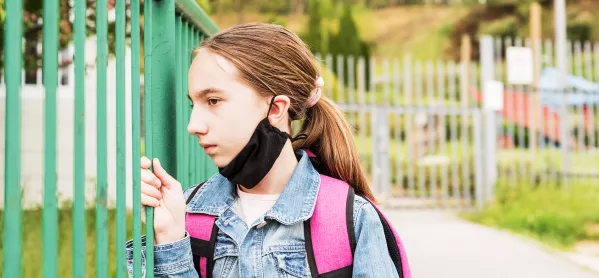Covid inquiry: ‘Mistake’ to keep schools shut

The decision to keep schools closed to most pupils between March and September 2020 as other parts of society were allowed to open up was a “major mistake”, the former children’s commissioner has said.
In evidence shared at the Covid inquiry this morning, Anne Longfield said that the government’s decisions on school closures showed an “apparent lack of any serious recognition of the short-term and long-term harmful effects of prolonged school closures on children”.
Ms Longfield, who was in post during the pandemic, added that the decisions taken were a “disaster” for vulnerable pupils and pointed to an “apparent failure of the government to prepare realistically for the scale and duration of school closures”.
- Covid inquiry: How schools are still blighted by the pandemic
- Costs crisis: catch-up progress could be lost
- Catch-up: Attainment gap progress could take decade to restore
In response to the pandemic, schools closed to most pupils between March and September 2020, and teaching took place online.
Key-worker parents and disadvantaged students were still able to attend, however.
Ms Longfield was children’s commissioner from January 2020 to February 2021, and is now chair of the Commission on Young Lives.
Boris Johnson, the prime minister during the pandemic, announced that education was one of the top three priorities for easing lockdown in 2021, saying that society needed to focus on the “loss of learning”.
However, Ms Longfield said she did not believe that his actions lived up to these words: “The government did not provide adequate resources to mitigate the impact of the Covid pandemic on children,” she told the inquiry.
She also identified the lasting effects of the pandemic on pupils’ learning, saying that the government did not “help them recover from the negative impact of the emergency”.
“This is especially the case for disadvantaged children,” she added.
Delays in learning
In April 2022, Ofsted reported that the pandemic and lockdowns had resulted in delays in learning speech and language, problems with social interaction and confidence - such as not knowing how to take turns and struggling to make friends - and delays in walking and crawling, with more obesity as a result.
Ms Longfield said it was “not apparent that the extent of the potential risk of harm to vulnerable children was understood by the government”.
“While the pandemic, and our country’s response to it, was a major challenge for most children, it was a disaster for many disadvantaged children who were already living with risks and vulnerabilities in their lives,” she wrote in her statement to the inquiry.
The National Foundation for Educational Research, highlighted the continued impact of the pandemic on the lowest attainers and disadvantaged students in a report published this week.
Ms Longfield said she “supported” and “encouraged” schools remaining open for vulnerable pupils during school closures, but said that “most vulnerable children did not attend school during the closures”.
“This has been attributed to various factors, including the stay-at-home message from the government and the fact that the policy was not backed up by consistent encouragement and support,” she added.
However, she also believes that this reflects a “lack of understanding of the complex challenges and difficulties faced by such children and their families, and the barriers to attendance and engagement.”
Ms Longfield’s comments follow MPs’ fears that the prospects of a “generation of children” could be damaged by the impact of the pandemic unless the government takes faster action.
Analysis conducted by the Office for National Statistics of students during the pandemic showed that pupils in deprived areas were almost twice as likely to report falling behind in their education owing to pandemic disruption.
The government’s work during the crisis will continue to be scrutinised over the coming weeks, as the inquiry examines key decision making in Westminster from the virus outbreak in January 2020 to the end of Covid-19 restrictions in February 2022.
You need a Tes subscription to read this article
Subscribe now to read this article and get other subscriber-only content:
- Unlimited access to all Tes magazine content
- Exclusive subscriber-only stories
- Award-winning email newsletters
Already a subscriber? Log in
You need a subscription to read this article
Subscribe now to read this article and get other subscriber-only content, including:
- Unlimited access to all Tes magazine content
- Exclusive subscriber-only stories
- Award-winning email newsletters



